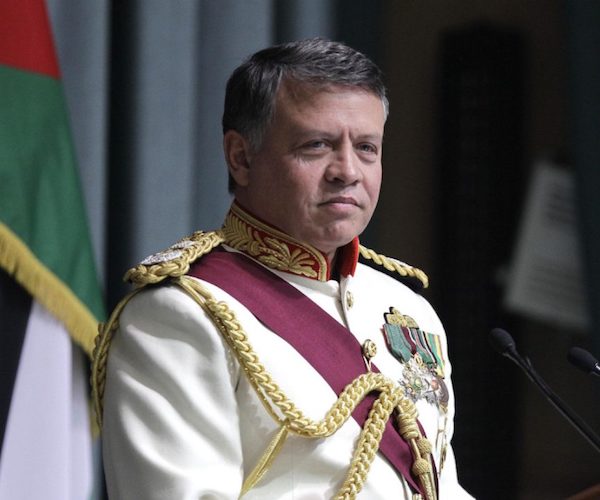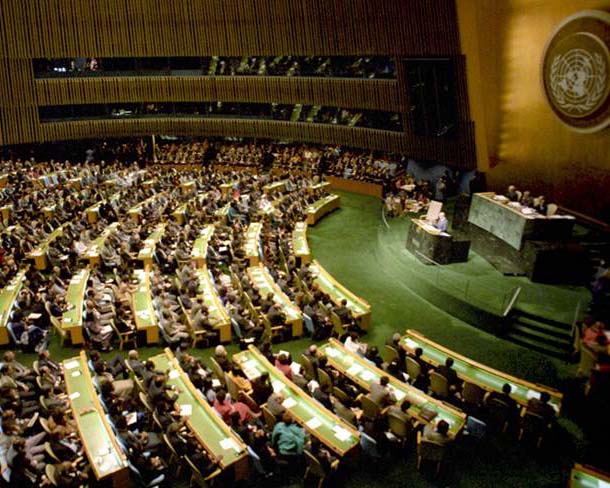Jordan attempts to transform challenges into opportunities
 Jordan’s King Abdullah II ascended to the throne after King Hussein’s passing in February 1999. Ever since, he has ruled over a relatively stable country despite challenges and hardships ranging from terrorism and extremism to economic problems. Benefitting from its strategic location in the Middle East, Jordan is a model of tranquility and security as King Abdullah II usually says. The Hashemite Kingdom is gearing towards becoming an effective regional player, and the Arab country has worked hard to turn challenges into opportunities.
Jordan’s King Abdullah II ascended to the throne after King Hussein’s passing in February 1999. Ever since, he has ruled over a relatively stable country despite challenges and hardships ranging from terrorism and extremism to economic problems. Benefitting from its strategic location in the Middle East, Jordan is a model of tranquility and security as King Abdullah II usually says. The Hashemite Kingdom is gearing towards becoming an effective regional player, and the Arab country has worked hard to turn challenges into opportunities.
For the past 18 years, King Abdullah II has managed to fend off foreign threats and secure key alliances to protect the kingdom’s political and economic interests. Given Jordan’s location in the middle of a turbulent region and as a resource-poor country, the Hashemite Kingdom has long relied on foreign assistance, especially from Western and Arab Gulf states. The late King Hussein established very well-trained security and military forces that helped keep Jordan resilient despite hardships and pressures. The king’s meeting with US President Donald Trump in early February underscored Washington’s view of Jordan as a pivotal player in the Middle East and the US dependence on Amman for solutions to pending regional issues.
King Abdullah II is presently building on the national ethos of the Jordanian people to develop their country as a model for others to follow in terms of pluralism, cohesion, modernity, and moderation. To be sure, Jordanians of all backgrounds have built the Hashemite Kingdom, and this fabric enhances the unity of the people and their respect for fellow citizens regardless of religion or roots.
Since inheriting the throne in 1999, King Abdullah II has taken an oath to develop the Hashemite Kingdom and make it prosperous through balanced economic plans and socio-economic initiatives, launching private and public partnerships to help boost the country’s growth. The financial crisis of 2008/2009 hit Jordan hard and forced some of these ambitious plans to go on the backburner. In 2011, the Arab Spring uprisings which erupted across the Middle East were a wake-up call for all Arab leaders to implement political reforms and empower their citizens. The king established the foundation for reform that Jordanians sought with constitutional changes to enhance civil rights, separation of powers, and new parameters for the monarch’s responsibilities. The fruits of the political reform after 2011 were the formation of a constitutional court and an independent election committee, where the king plays the role of guarantor of the political reform.
Jordan’s young generation has high expectations, seeking economic and political reforms that can create jobs for recent university graduates. Although the country has been spared the chaotic unrest of some of its neighbors in recent years, the pressures of catering to the demands of a population that have endured the effects of belt-tightening economic reforms are real and continue to pose challenges for the government in Amman. Last month, protests took place across several Jordanian cities/towns (Karak, Tafliah, Salt, and Madaba) as a response to recently enacted austerity measures, including hiked taxes on food items and certain services. Many expressed anger at the “government of taxes” while calling for Prime Minister Hani Mulki’s resignation. Like other Middle Eastern countries, Jordan has a particularly high youth unemployment rate, which is approximately 29 percent, according to World Bank estimates. Last summer clashes broke out between protestors and police in Dhiban district, one of Jordan’s poorest areas. The protestors were demanding improved economic conditions and employment.
Within this context, officials in Amman are focused on addressing the Jordanian people’s concerns which include not only unemployment, but also water, electricity and living conditions. The King through his plans and policies is giving due support to civil society to become increasingly involved in Jordan’s development, helping the monarch save his country the calamities and scourges of the Arab Spring’s destabilizing fallout.
The Hashemite Kingdom receives ample support from many countries outside the Middle East, including the US, European Union, China, Russia, South Korea, and Japan. This international support has been crucial as Jordan grapples with the challenges stemming from economic hardships exacerbated by the influx of hundreds of thousands of refugees fleeing the carnage in Syria. Indeed, the crisis in Syria has placed Jordan under heavy pressure, challenging Amman to protect the kingdom from future destabilizing spillover effects. Of course, the ongoing conflict in Israel/Palestine and Iraq’s tumultuous and violent state of affairs continue to threaten Jordan’s interests in terms of promoting a two-state solution in line with the Arab Peace Initiative, aborting terrorism, and countering extremism.
Without peaceful resolution to the Syrian crisis, which is unfortunately difficult to imagine, the Hashemite Kingdom will continue to face daunting challenges. In addition to the influx of refugees, the country’s economy is under heavy pressure from the threat of Salafist-jihadist terrorists from Islamic State and other extremist factions in the Levant seeking new targets in the Middle East as the Islamic State loses its grip on Raqqa and Mosul. In the face of such economic and security threats, Jordan continues to want to present itself as an example of a thriving Arab state that embraces pluralism, pragmatism, tolerance, and moderation in a region beset by extremism and tumult.
With King Abdullah II hosting the Arab League summit in Jordan this month—the first in Amman since 2001—the Hashemite Kingdom will attempt to promote Arab consensus and unity on a host of issues. As proxy wars and inter-Arab rivalries have polarized the Middle East, such divisions have prevented the Arab League from finding viable solutions to grave regional crises. Although the positive effects of Arab League summits are usually minimal and expectations for this month’s meeting in Amman are justifiably low, the challenge of promoting realistic ideas for solving the problems facing millions of Arabs is one that Jordan’s ruler has fully accepted.
Shehab al-Makahleh (Sam Mak) is a senior advisor at Gulf State Analytics with experience as a political advisor in the United Arab Emirates, member of IMESClub. Photo: King Abdullah II
Initially published in LabeLog: http://lobelog.com/jordan-attempts-to-transform-challenges-into-opportunities/
Can the new UN chief help resolve the Syrian crisis?
 United States has officially announced the suspension of diplomatic cooperation with Russia on Syria. That brings to an end coordination of efforts to counter terrorism and also the ceasefire that was in place.
United States has officially announced the suspension of diplomatic cooperation with Russia on Syria. That brings to an end coordination of efforts to counter terrorism and also the ceasefire that was in place.
Basically, it seems, Washington failed to distinguish between Jabhat an-Nusra and the so-called moderate rebels. Russia, on the other hand, has failed to fulfill its commitments. Irre-spective of whether this is due to lack of influence on Damascus, Russia has driven itself to a narrow corridor with not so well thought out policy. It seemed to be following Napoleon’s logic of jumping into the fray and then figuring out what to do next.
There have been miscalculations, difference over stated and real objectives in the Syrian conflict while the geopolitical intrigues and mistrust have brought about the paralysis of the entire political process.
The UN has failed in its mission due to many reasons including tension between global players such as Russia and the US. This has been exacerbated by the opposition’s lack of be-lief in any talks with Damascus and the UN’s failure to invoke the international system.
A new round of talks was scheduled to be held in the end of August but is now unlikely in the near future. Under these circumstances, which are pushing the world to the brink of a global conflict, we need more than ever the strong a truly powerful United Nations.
The election of the new Secretary General of the UN deserves special attention. Ban Ki-moon’s successor will not only inherit unresolved conflicts but also the full new pack of rapidly developing threats coming from two superpowers.
The problem is that while promoting their candidate countries are guided not by the desire to strengthen the UN as an institution, to enable it to tackle global threats, but instead fol-low their own interests. The US seems to be interested in a female candidate to occupy the chair, while Russia promotes Eastern European candidate.
The leader of the UN should have enough courage to push the entire organization toward reforms. For this the UN needs a very determined and resolute person who is ready to take risk and bear the responsibility for each step taken and its consequences. The new UN Sec-retary General should be truly independent and try to return to the UN its damaged reputa-tion.
The new Secretary General should also be as active as possible in the media, competing with the major world leaders in popularity. Theoretically he or she should be a well-known per-sonality with an unblemished reputation and enjoy universal esteem. The UN needs a leader that helps the world body truly serve the cause of peace, not interests of any player or a group of players.
The problem is that among the candidates to the Secretary General there is no figure that would correspond to all of these parameters. It is likely that the UN will continue to face the same challenges, which means it will continue to become more and more irrelevant and far removed from the global agenda leaving crisis resolution to the US and its allies. Russia, on the other hand, will try to bring debates back to the UN, trying to use the advantages of the UN in its current form; based on the same mechanism as in 1945.
The debates over comprehensive UN reforms have continued for too long and will not change no matter who is elected. However, it is the right moment to fully realize the fundamental importance of the UN.
The conflict seems to have reached a dead-end in Syria with all sides having little under-standing of what to do next. What is clear is that the country will be generously fueled with arms. The US and Russia tensions and mutual accusation will continue to rise.
Even as diplomacy stalls, Russia continues to deploy its advanced anti-missile and anti-aircraft system SA-23 Gladiator and bombers. This time the air defense system is deployed not just to protect Russia’s contingency, but Damascus and the ruling regime even as the already deployed S-400’s purpose is changing as well.
Russia will try all possible means to prevent the repeat of Libyan scenario in Syria. The sig-nificant build-up of weapons in Syria and the deepening rivalry enhances the possibility of the Russian collision with coalition forces in the air.
To prevent the worst case scenario, we need the strong and mighty UN, to convincingly en-courage the parties involved to understand the dangerously developing situation and act to ensure peaceful coexistence. Otherwise it seems like we are all doomed.
Article published in Al Arabiya English
https://english.alarabiya.net/en/views/news/middle-east/2016/10/05/Can-new-UN-Secretary-General-help-resolve-the-Syrian-crisis-.html











